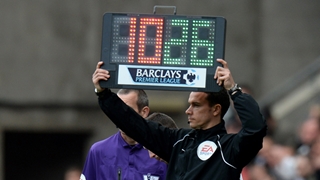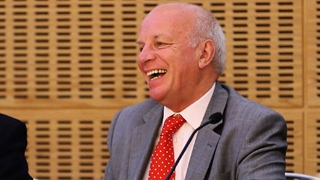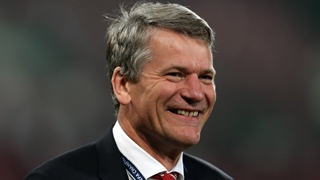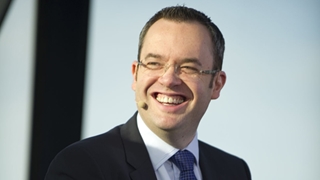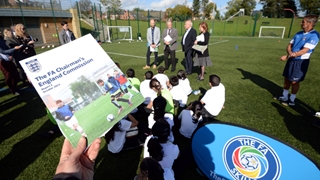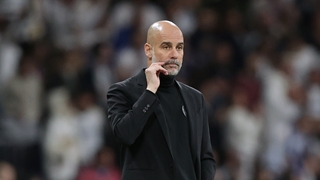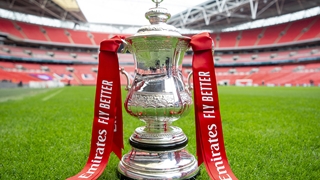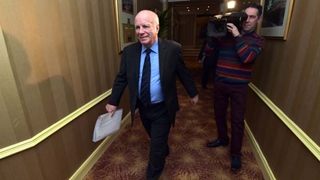
The FA Chairman, along with Vice-Chairman David Gill, led the English delegation at the 129th gathering of the International Football Association Board (IFAB), held at the Culloden Hotel in Craigavad, near the Northern Ireland capital.
Each of the four British Associations have one vote each on the body while FIFA has four votes, with a 75 per cent majority required for any law changes.
Among the items discussed was the potential use of video to support match officials, with the four home nations having received a presentation on a Dutch FA trial earlier this week.
An extensive discussion took place including feedback from the two advisory panels and the IFAB decided that this topic should continue to be discussed by the panels in more detail.
Speaking afterwards, Dyke said: "I was very much in favour of doing more trials. There is the one in Holland, and I would like to see some more.
"I don’t think we decided that we wouldn’t do some more but it is clearly going slower than some of us would have like...I think we are going to look back in 20 years and say ‘wasn’t it quaint that we didn’t use it when it was available’ – but only to help referees and not for any other reason.
"The point I made in the meeting was ‘let’s not wait for another Frank Lampard goal, which went over the line’.
"Let’s get on the front foot and start analysing. It is going to take some time and you are not going to rush it. I do think we should do more trials and next year or the year after, we should start taking some real decisions."
Saturday’s AGM followed on from the inaugural meetings of two new advisory panels – the Football Advisory Panel and Technical Advisory Panel – in November 2014, which brought together experts from across the world of football to support the board with greater expertise before decisions on the Laws of the Game are passed.
Following further analysis of the so-called “triple punishment” (Law 12) of sending off, penalty and suspension for the denial of an obvious goal-scoring opportunity within the penalty area, The IFAB agreed the punishment is too harsh and that a solution must be found.
The proposal put forward by UEFA, including a provision that detailed specific instances where a referee should issue a caution instead of a red card, was rejected. After much debate, the IFAB agreed in principle that one element of the triple punishment may be removed and that this element should be the automatic one-match suspension that is currently defined in the FIFA Disciplinary Code.
The IFAB has tasked FIFA and its Disciplinary and Legal Committees to investigate the feasibility of administering on a global level the removal of the automatic one-match suspension for offences relating to the denial of an obvious goal-scoring possibility that are not considered serious infringements.
Subject to the outcome of that analysis, FIFA will submit a proposal for potential changes to the FIFA Disciplinary Code to the FIFA Executive Committee in March for decision.
In relation to Law 3 – The Number of Players, the IFAB made a ground-breaking decision to allow for return substitutions in the lowest levels of football.
It follows the success of two separate pilot programmes run by The FA and the Scottish Football Association, the results of which demonstrated substantial increases in participation levels across the game. The new provision outlines that the use of return substitutes will be subject to agreement of the member association concerned.
Also in relation to Law 3, the IFAB remains of the view that a total of three substitutions is the appropriate number for a football match. It was agreed that the proposal for a fourth substitution in extra time, which was on the agenda today, should be assessed by the advisory panels before any further discussion by the IFAB.
On the matter of electronic performance and tracking systems, the IFAB approved in principle the use of such devices, on the condition that the data is not made available to anyone inside the technical area during a match. The next step will be the introduction of a quality programme in order to categorise such devices, to regulate their use, and to ensure the validity and reliability of the collected data, before any changes to the Laws of the Game can be considered by the IFAB.
Other topics to be referred to the panels include handling the ball, the potential use of “sin bins” and the interpretation of the offside law. A proposal from US Soccer regarding stopping the clock was not approved.
The two panels are scheduled to meet twice this year before November’s Annual Business Meeting, which is a working meeting of the IFAB where potential changes to the Laws of the Game can then be put forward to the AGM for decision.
As a final agenda item, the IFAB acknowledged the contribution of the late William McCrum, who, as a member of the Irish FA, proposed the idea of the penalty kick in 1890. FIFA has agreed to fund the restoration of William McCrum’s grave, which has fallen into disrepair.
The modifications to the Laws of the Game made at today’s AGM will come into effect on 1 June 2015.
The 130th Annual General Meeting is set to take place in Cardiff, Wales, on 4-6 March 2016.




